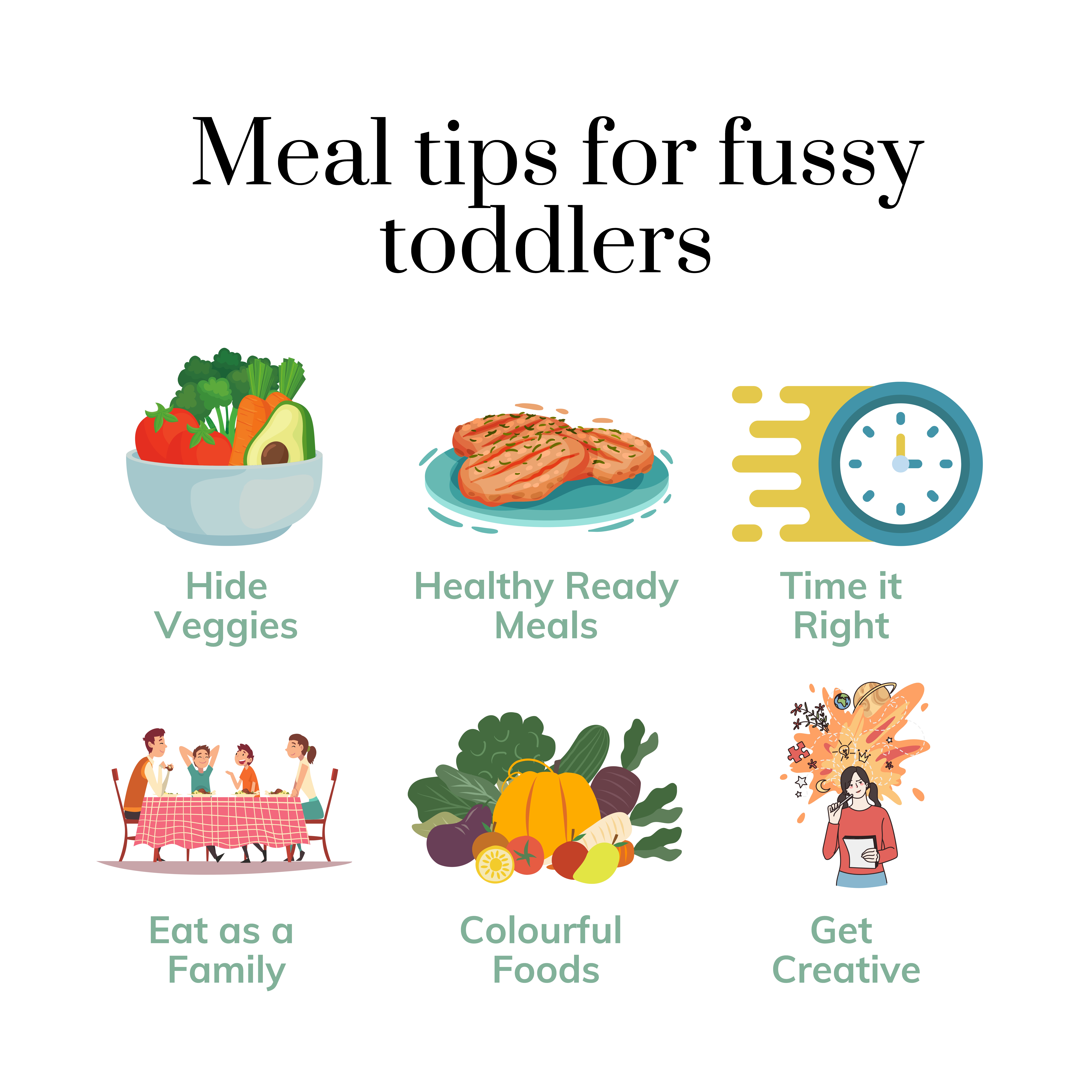Mealtime with a fussy toddler can sometimes feel like a battle of wills. The struggle to get them to eat anything other than their favourite snacks can be real. But fear not, parents – with a dash of creativity, a sprinkle of patience, and a pinch of nutritional know-how, you can turn mealtime into a fun and enjoyable experience for you and your little one.
In this blog, we’ll delve into expert tips for cooking meals that fussy toddlers will love while exploring the convenience of ready meals when life gets extra busy.
Meal ideas for fussy toddlers to make mealtimes easier Embrace colourful creations: make meals visually appealing
Embrace colourful creations: make meals visually appealing
Toddlers are often drawn to vibrant colours and interesting shapes. Use this to your advantage by creating visually appealing meals. Incorporate a variety of colourful fruits and vegetables, and consider arranging them into fun patterns or smiley faces on the plate. Our kids’ oriental chicken noodles would be the perfect meal to test this tip!
Finger food fun: opt for bite-sized delights
Toddlers love to explore their food, and bite-sized options are perfect for their tiny hands. Create mini versions of their favourite foods – think bite-sized sandwiches, mini meatballs, and cut-up fruits.
Sneak in nutrients: creative ways to hide veggies
Toddlers might not always be eager to eat their veggies, but you can sneak them into their meals. Blend vegetables into pasta sauces, bake them into muffins or pancakes, or mix them into meatballs for an extra boost of nutrition.
Our kids’ hidden veg mac and cheese would be the perfect meal to test this tip!
Make it interactive: DIY mealtime
Set up a build-your-own meal station. Whether it’s tacos, pizzas, or sandwiches, letting your toddler assemble their own meal can be exciting and empowering. It also gives them some control over what they’re eating. Letting your child cook with you can have a positive impact on their meal times.
Stick to a routine: predictable meals
Toddlers thrive on routine. Establish regular meal and snack times to create a sense of predictability. When they know when to expect food, they’re more likely to come to the table with an appetite.
Ready meals: convenience without compromise
We all have those days when time is tight. Ready meals can be a lifesaver on such occasions. These pre-packaged meals are designed to be quick, easy, and convenient, which is a boon for busy parents. Ready meals are no longer limited to just unhealthy options – there are now many nutritious choices available that are tailored to toddler palates.
Here at Hey Fresto!, we have a range of kids ready meals to choose from that are healthy and nutritional.
Make it a family affair
Eating together as a family can encourage them to try new things by seeing everyone else enjoy them. It can also create a sense of calmness for your toddler if meal times specifically cause them distress. Sitting down to eat with your toddler will also help you to efficiently monitor your child’s food intake and their specific reactions to certain foods.
Time it right
Serve meals when your toddler is hungry but not starving. A hungry toddler might be more willing to try something new. We all know how uncomfortable it can be when you over eat or force yourself to eat when you’re not specifically hungry. If your child is not hungry then the thought of eating combined with the experience of trying a new food may cause them a considerable amount of stress.
Respect their appetite
Toddlers’ appetites vary from day to day just like ours can. If they don’t seem to be particularly hungry on a given day then don’t try to force them to eat. One day of a small consumption of food won’t affect your toddler too much. If they do accept a meal, don’t force them to finish – focus on creating a positive mealtime environment. If your toddler is continuously not hungry and it is a cause for concern, you may wish to contact your doctor.
Get creative with shapes
Use cookie cutters to create fun shapes out of sandwiches, fruits, and even veggies. As well as exploring the taste of food, your child is also learning about its shape and texture. Making this a little more exciting for your toddler may help to encourage them to try new foods.
Camouflage with cheese
Melted cheese can make almost anything more appealing. Add a sprinkle of shredded cheese to veggies or whole wheat pasta. Again, our kids’ hidden veg mac and cheese would be the perfect meal to test this tip!
Set a positive example
Toddlers often mimic what they see. Enjoy a variety of foods yourself to encourage them to do the same. If they are reluctant to try a new food, have some with them and show them your positive reaction to the food. This may help to diminish some of the fear your child may have about trying a new food.
Make food fun
Turn meals into adventures. Call broccoli “dinosaur trees” or carrots “orange rockets.” The more creative you can get with your meal times the more likely it is to create a fun experience for your toddler.
Toddler Nutrition Tips
Toddlerhood is a crucial stage of development, marked by rapid growth and exploration. Proper nutrition during this period lays the foundation for a lifetime of good health.
Nutrient-rich diet
Toddlers need a balanced diet that provides essential nutrients for their growing bodies and minds. Focus on a variety of foods from all the major food groups. Healthy nourishing food will help to nourish your child’s mind.
Fruits and vegetables
These are rich in vitamins, minerals, and fibre. Aim for a rainbow of colours to ensure a diverse nutrient intake.
Whole Grains
Opt for whole grains like whole wheat, oats, and brown rice over refined grains. They provide sustained energy and essential nutrients.
Protein
Incorporate lean protein sources such as lean meats, poultry, fish, beans, lentils, and tofu. Protein supports muscle and tissue growth.
Dairy or dairy alternatives
Milk, yoghurt, and cheese are excellent sources of calcium and vitamin D, vital for bone development. If your toddler is lactose intolerant, choose fortified plant-based alternatives.
Portion sizes
Toddlers have small stomachs, so it’s important to offer appropriate portion sizes. Pay attention to your child’s hunger and fullness cues. Offer small, frequent meals and snacks to ensure they’re getting enough nourishment throughout the day.
Hydration
Proper hydration is key to maintaining good health. Offer water throughout the day and limit sugary beverages. Avoid excessive juice consumption, as it can displace more nutrient-dense foods from your toddler’s diet.
Healthy fats
Fats are essential for brain development and overall growth. Include sources of healthy fats, such as avocados, nuts, seeds, and olive oil, in your toddler’s diet.
Limit Added Sugars and Salt
High sugar and salt intake can lead to health issues later in life. Limit sugary snacks, candies, and processed foods. Instead, offer naturally sweet options like fruits.
Picky Eaters
Toddlers often exhibit picky eating behaviours, which can be frustrating for parents. Be patient and offer a variety of foods multiple times. Keep introducing new foods, and involve your child in meal preparation to make it more engaging and appealing.
Multivitamin supplements
A balanced diet should provide toddlers with the necessary nutrients. However, consult your paediatrician before considering any supplements.
Toddler nutrition is crucial for healthy development. By providing a diverse and nutrient-rich diet, encouraging healthy eating habits, and fostering a positive mealtime environment, you can set your child on the path to a lifetime of well-being. Remember that each child is unique, so pay attention to their needs and consult a healthcare professional if you have any concerns about your toddler’s nutrition.
You should also consider the portion sizes of your toddler’s meals. Depending on their activity level, size and age, it is recommended that toddlers consume between 1,000 to 1,400 calories a day.
If you are worried about your toddler’s calorie consumption, you should consult your child’s doctor or a nutritionist.
Cooking for a fussy toddler requires patience, creativity, and flexibility. Experiment with flavours, textures, and presentations to discover what appeals to your little one’s palate. Remember that ready meals can be a helpful solution on hectic days, providing a nutritious and convenient option that meets your toddler’s needs. With a mix of homemade creations and ready meals, you can easily navigate the picky eater phase, making mealtime a time of exploration and enjoyment for your toddler and a sigh of relief for you. Happy cooking!
